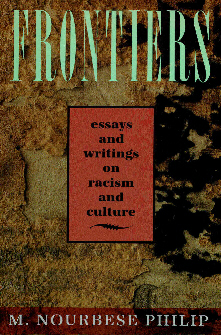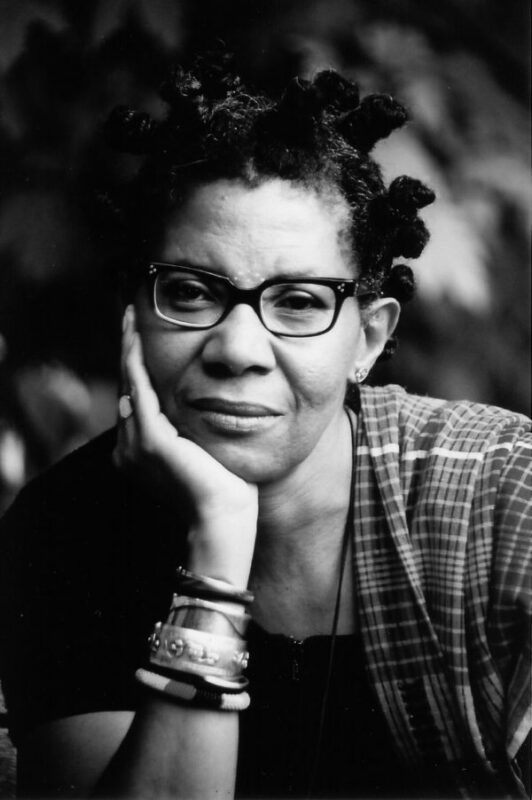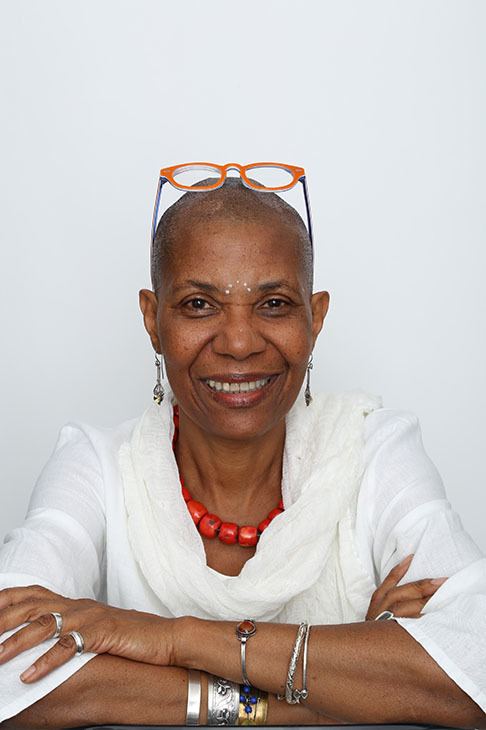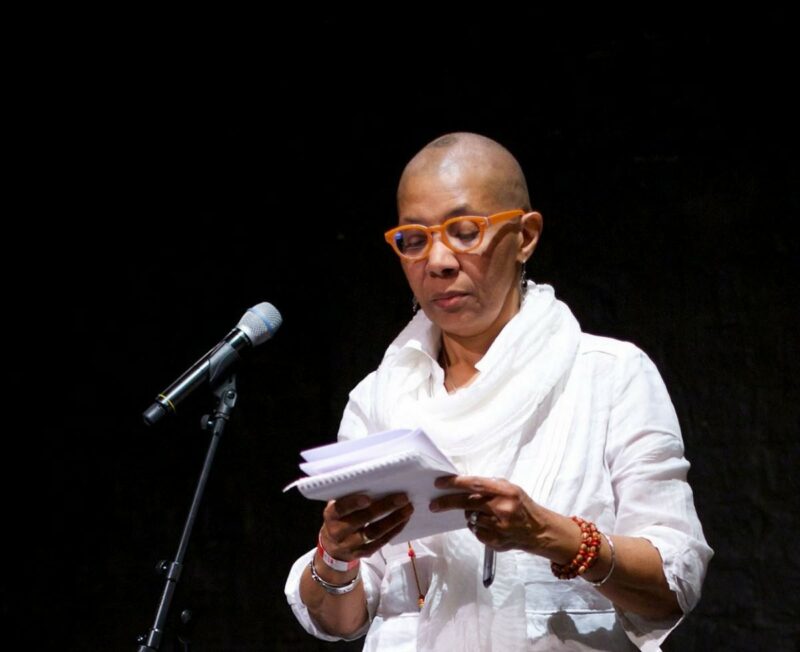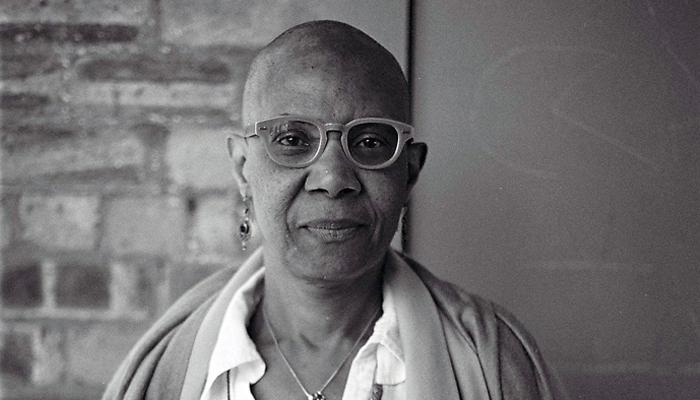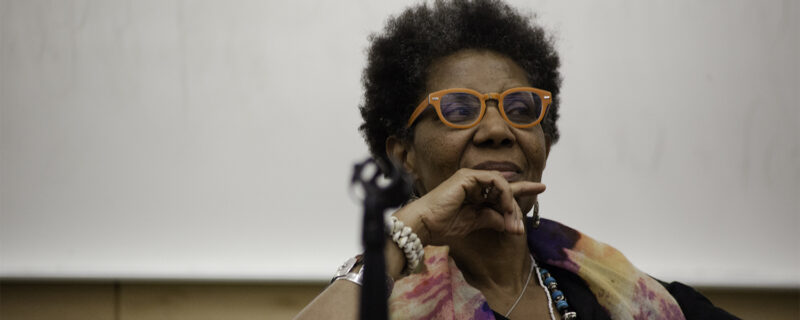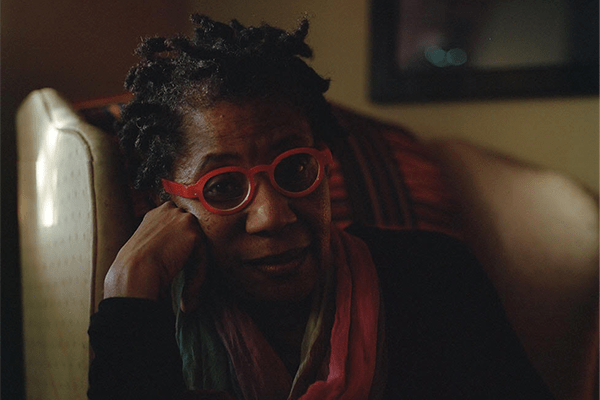
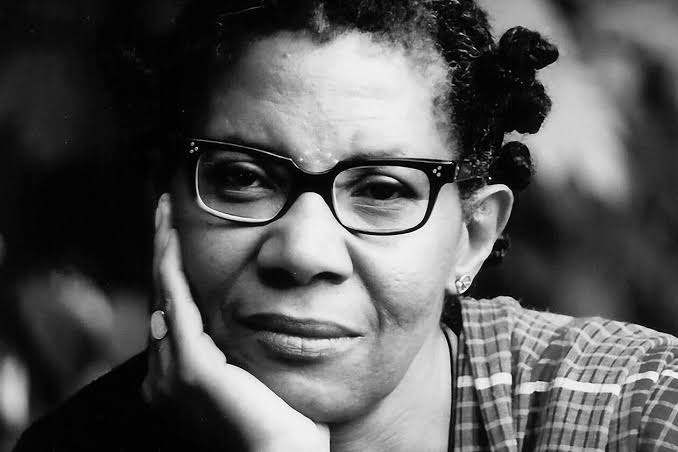
m. nourbeSe philip
Award-winning Poet, Writer, Lawyer
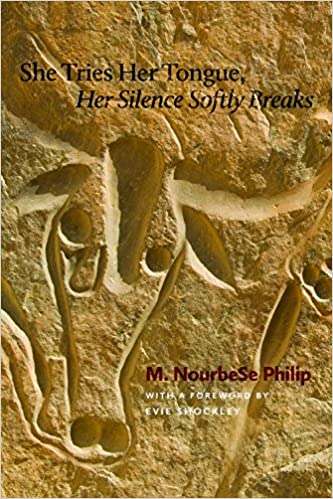
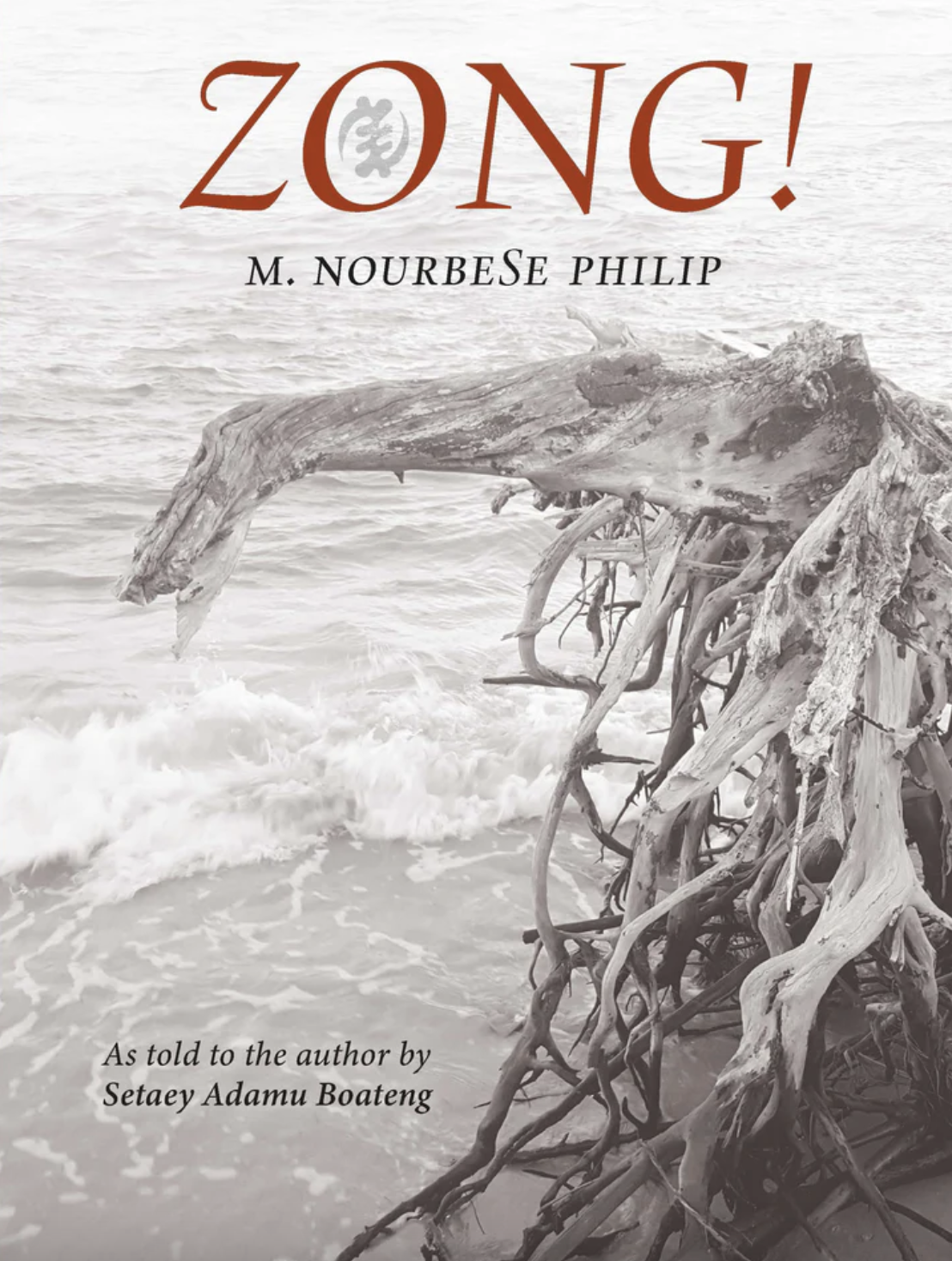
Readings &
Lecture Topics
- An Evening with M. NourbeSe Philip
Biography
“Brilliant, lyrical, and passionate… running along the themes of language, racism, colonialism, and exile.”―Publishers Weekly
“m. nourbeSe philip writes a poetry whose innovation―her spells of silence, her stuttering syntax―is not an abstract experiment but a form of mourning for African words prohibited by ‘the ceremony of White in the elsewhere of time.'” ―Literary Hub
“Those still confused about why poetry might fracture and splinter and stutter can find an answer in the work of m. nourbeSe philip. She delves into the trauma of the plantation economy and allows her language to be shaped by the conflicts between telling and not telling, between naming and not naming that define [history]… Exceptional and uniquely moving.”―Juliana Spahr
Poet, essayist, novelist, playwright, and former lawyer m. nourbeSe philip was born in Tobago. An author across genres, her collections of poetry include Thorns (1980), Salmon Courage (1983), and the seminal work, She Tries Her Tongue; Her Silence Softly Breaks (1988, 2015), which, in manuscript form, was awarded the Casa de las Americas prize for poetry. philip’s best known work is her fourth book of poetry, Zong! (2008, 2011, 2023), the book relies entirely on the words of the legal decision Gregson v. Gilbert, the English case related to the massacre of 150 Africans murdered by drowning so that the ship’s owners could collect insurance money in 1781.
Equal parts song, moan, shout, oath, ululation, curse, and chant, Zong! excavates the legal text by colliding memory, history, and law resulting in a poetics of the fragment. Through the innovative use of fugal and counterpointed repetition, Zong! becomes an anti-narrative lament that stretches the boundaries of the poetic form, haunting the spaces of forgetting and mourning the forgotten. Nathaniel Mackay says of the work: “A brash, unsettling book, Zong! wants to chant or shout history down, shut history up. It not only laments and mimics history’s unreason but, verisimilar and retributive both, deranges history, as if to reorder its linguistic protocols might undo or redo history itself. Fretful, possessed, obsessed, upset, curse and homeopathy, both, it visits a breathtaking run of glossolalic scat upon historical trauma.”
Her published fiction includes short stories and her first novel, Harriet’s Daughter (l988, 1989, 2022), a now-classic young adult work that navigates the adolescent friendship between two girls of Caribbean background living in Toronto. The work was one of two runners up in the l989 Canadian Library Association Prize for children’s literature as well as first runner up in the Max and Greta Abel Award for Multicultural Literature, and required reading for Caribbean secondary level students for over a decade. Her second novel, Looking For Livingstone: An Odyssey of Silence (1991, 2007, 2018), is a hybrid quest narrative in poetry and prose, which explodes Western assumptions about the “silence” of indigenous peoples; this is an elegant work which beautifully gives voice to the ancestors to whom it is dedicated.
philip’s dramatic work includes Coups and Calypsos (2001), which was produced in both London and Toronto in 1996.
Her essay collections include Frontiers: Essays and Writings on Racism and Culture (1992), Showing Grit: Showboating North of the 44th Parallel (993), and A Genealogy of Resistance and Other Essays (1997). Her essay “Caribana: African Roots and Continuities–Race, Space and the Poetics of Moving” (1996) was published as a chapbook. Like her other collections, her most recent collection, BlanK (2017), demonstrates her continuing engagement with the tradition of the socially and politically-engaged poets, novelists and artists of the Caribbean. Alongside her poetry they articulate a powerful and decades-long engagement with issues generated by the destructive legacies of colonialism in both the Caribbean and Canada, even as they display a lifelong concern with the possibilities afforded by language to interrogate and remake these legacies.
philip is the recipient of a Pushcart Prize for her poetry, as well as the Lawrence Foundation Award by the journal Prairie Schooner for her short story “Stop Frame.” She has received awards, fellowships, and grants from both the Guggenheim Rockefeller (Bellagio) Foundations, the McDowell Colony, the Canada Council for rhe Arts, the Toronto Arts Foundation Award, and the Ontario Arts Council. She was also the winner of the 1988 Tradewinds Collective Prize in both poetry and short fiction, the Toronto Arts Foundation Award in writing and publishing, the YWCA Woman of Distinction award in the Arts. philip was recognized for her work as “a revolutionary poet, writer and thinker” by the Elizabeth Fry Society of Toronto, which presented her their 2001 Rebels for a Cause award. She was awarded a 2002 Chalmer Fellowship for research by the Ontario Arts Council and in 2021, she received the Canada Council for the Arts, Molson Prize, awarded annually for artists who have “distinguished themselves by their outstanding achievements.” In 2023 she was the Bain-Swiggett Chair in Poetry at Princeton University for the Spring semester. In 2024 she became a recipient of the Windham Campbell Prize for poetry.
philip’s short stories, essays, reviews, and articles have appeared in magazines and journals in North America and England, and her poetry has been extensively anthologized. Her work – poetry, fiction and non-fiction – is taught widely at the university level and is the subject of much academic writing and critique. Her poetry and fiction have also been translated into Spanish and German.
She resides in Toronto, Ontario.
Short Bio
Born in Tobago, m. nourbeSe philip is an unembedded poet, essayist, novelist and playwright who lives in the space-time of Toronto. A former lawyer, her published works include the award-winning YA novel, Harriet’s Daughter, the seminal poetry collection, She Tries Her Tongue; Her Silence Softly Breaks, the speculative prose poem, Looking for Livingstone: An Odyssey of Silence, as well as her genre-breaking book-length epic, Zong! As told to the author by Setaey Adamu Boateng. She has written several collections of essays including Frontiers: Essays and Writings on Racism and Culture and A Genealogy of Resistance; her most recent collection is BlanK. philip is a fellow of both the Guggenheim and Rockefeller (Bellagio) Foundations and in 2020 was the recipient of PEN/Nabokov Award for Achievement in International Literature. In 2021, she was awarded the Canada Council for the Arts Molson Prize by the Canada Council for her outstanding achievement in the arts. In 2023 she was the Bain-Swiggett Chair in Poetry at Princeton for the Spring semester. In 2024, she became a recipient of the Windham Campbell Award for Poetry.
Visit Author WebsiteVideos
Publications
She tries her tongue, her silence softly breaks
Poetry, 2015
Brilliant, lyrical, and passionate, this collection from the acclaimed poet m. nourbeSe philip is an extended jazz riff running along the themes of language, racism, colonialism, and exile. In this groundbreaking collection, philip defiantly challenges and resoundingly overthrows the silencing of black women through appropriation of language, offering no less than superb poetry resonant with beauty and strength. She Tries Her Tongue, Her Silence Softly Breaks was originally published in 1989 and won the Casa de Las Americas Prize.
Zong!
Poetry, 2011
In November, 1781, the captain of the slave ship Zong ordered that some 150 Africans be murdered by drowning so that the ship’s owners could collect insurance monies. Relying entirely on the words of the legal decision Gregson v. Gilbert―the only extant public document related to the massacre of these African slaves―Zong! tells the story that cannot be told yet must be told. Equal parts song, moan, shout, oath, ululation, curse, and chant, Zong! excavates the legal text. Memory, history, and law collide and metamorphose into the poetics of the fragment. Through the innovative use of fugal and counterpointed repetition, Zong! becomes an anti-narrative lament that stretches the boundaries of the poetic form, haunting the spaces of forgetting and mourning the forgotten.
Looking for Livingstone: An Odessy of Silence
Novel, 2007
Harriet's Daughter
Novel, 1989
“Harriet Tubman was brave and strong, and she was black like me. I think it was the first time I thought of wanting to be called Harriet–I wanted to be Harriet.” Margaret is determined to be someone; to be cool, with style and class and to have a blacker skin. More than anything else she wants to help her best friend, Zulma, escape from Canada and fly back to Tobago to live with her grandmother. In this charming, humorous and perceptive tale of adolescence, m. nourbeSe philip explores the friendship of two young black girls and throws into sharp relief the wider issues of culture and identity so relevant to teenagers of all races and colours.
Frontiers: Selected Essays and Writings on Racism and Culture
Essay, 1992
Articles & Audio
Read What’s In Print
• Poet M. NourbeSe Philip awarded Molson Prize for ‘invaluable contributions to literature’ – CBC
• Zong! : A Book Review – Quarantine Content
• M. NourbeSe Philip’s epic poem Zong! gives voice to slave ship victims – CBC
• They Want that New New World: Review – Boston Review
• Poetry as Untelling: A Conversation with M. NourbeSe Philip – World Literature Today
• An Interview With M. NourbeSe Philip! – Poetry Foundation
Listen to Audio
• Episode 84: M. NourbeSe Philip – Commonplace Podcast
• M. NourbeSe Philip on the haunting of history – University of Oxford
Selected Writings
• Ferrum [excerpt] by M. NourbeSe Philip – Poets.org
Letters to the Future: Future
I am no more than three or four years old. I have accompanied my mother to the library in the largest town on a tiny Caribbean island. It is my very first time at a library and I am excited. I look, no I stare up and up and up—from my very tiny perspective the stacks that appear to go on forever . A sense of wonder fills me—-so many, many books! and I want them all.
I have always loved books. Will always love them and have recreated—to some degree—those stacks in my study. Books have been my life, not to mention lifeline to the past. And to the future. The written word the umbilical cord keeping me connected, sometimes unwillingly, to a matrix of some sort.
. . .
There was and is a history and a memory that connect me, a descendant of the Maafa, to an African living in Soweto. Just as it connects me to an African living in Brixton, Watts or New York, Port-of-Spain or Kingston.
The image of the sub-atomic particles also have bearing on the relationship between the past, present and future. Any change in one of these rhythmic time frames will affect the others. In other words, making a change in our present will, indeed, affect our past and our future. A change to our past will immediately affect our future, which begs the question of how or even whether we can even change our past. I’m suggesting that the work of imagining the past, the work of poets and writers and artists in general is a way of changing or bringing detail to that past, which in turn will affect our future.
African peoples have an enormous potential for forgiveness. Such forgiveness, and the healing generated by it, can only come with an acknowledgment—a public acknowledgement of the history of the crimes carried out by Europeans and Arabs against African people. It can only come when there is an acknowledgement that the pain of the African is the same—no less no more—as the pain of the European. It can only come with full reparations, which does not only mean monetary reparations. Indeed, there is no sum large enough to compensate for the losses and tragedies endured by Africans. If we understand what was broken and fractured by the trade, then reparations would naturally address those areas such as language, culture, genealogical records and so on. Forgiveness can only come with a genuine seeking of forgiveness by Europeans. It can only come with apologies. For the sin. That was the “of course iniquity” of the slave trade. The Maafa. While these are not forthcoming, the past and future will remain locked in a macabre dance with each other—the dance of death.
There comes a time in the individual life when the past becomes almost as important as the future. I continue, therefore, to imagine the past: I have the general outline and pattern of the event. Too many details are still missing, however, including accountability. In revisiting this essay, written at the dawn of the millennium, I have become keenly aware that my book length poem Zong! was an attempt on my part to imagine that past—to shatter the archival noise with the silenced sounds of those on board that fated ship. I remember the future in the gravely sweet face of Kalenjin. Her feet, when she sits, barely touch the floor.
“Are you writing about music,” she asks.
“Yes,” I answer, “the music of justice. And I write for you.”

